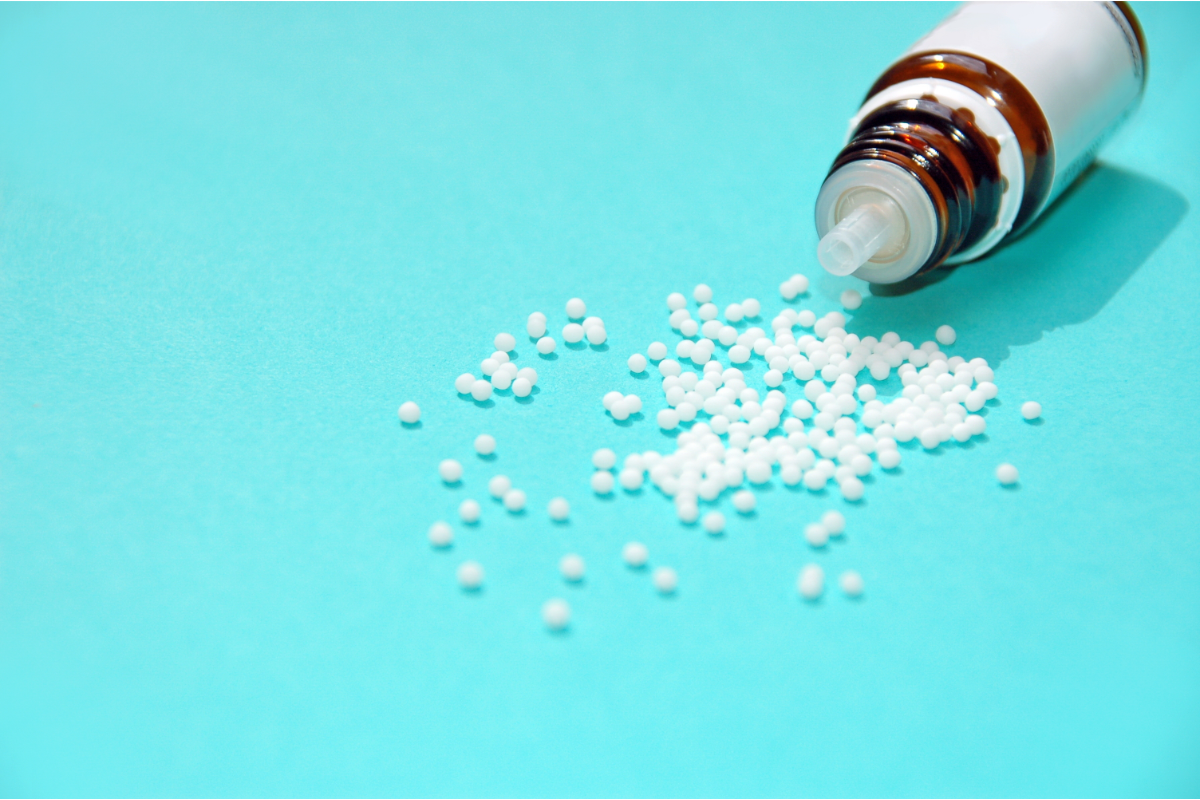Do you want to have a baby but are having difficulty conceiving? Are you thinking of taking real medical steps but are afraid? Why not try homeopathy?
What is homeopathy?
Homeopathy, as an alternative and holistic treatment for getting pregnant and having a baby, is a possible and safe solution.
Homeopathy is a holistic method of healthcare. It targets both physical and mental health. If administered to a patient with no specific needs, they would experience symptoms similar to those treated by homeopathy.
Homeopathic treatments are considered safe for consumption because the active principle that causes the ailment is present in infinitesimal quantities. This is what triggers the body’s immune response. However, it is important to consult your doctor before starting any homeopathic treatment.
What are the principles of homeopathy?
Like vaccines, which prevent the development of disease, homeopathy with an infinitesimal quantity of active principle stimulates the body to produce an immune response. The theory suggests that this immune response alleviates the physical symptoms of an illness. It restores bodily imbalances and boosts the body’s overall health.
Homeopathy is a medical approach based on three essential pillars:
- The Principle of Similarity: Formalised by Samuel Hahnemann in 1796, this principle postulates that any substance capable of causing symptoms in a healthy person can also, at minimal concentrations, treat similar symptoms in a sick individual.
- Infinitesimality: This concept concerns the method of preparing homeopathic remedies. In the Hahnemannian (DH or CH) or Korsakovian (K) methods, an active strain is diluted to extremely low levels. Each stage of dilution involves vigorous shaking, known as “dynamisation”.
- Individualisation or Globality: Homeopathy does not limit itself to treating isolated symptoms, but considers the patient as a whole, including both physical and psychological aspects.
What types of homeopathic medicines are there?
Legislation defines homeopathic products as being derived from homeopathic strains and complying with the pharmacopoeias of Europe, France or other EU Member States. There are two categories of homeopathic medicines:
- Non-proprietary homeopathic medicines: These are defined solely by their composition.
- Brand-name homeopathic medicines: These may be associated with a specific brand and often contain several active ingredients.
These components are regulated under article L.5121-1 11° of the French Public Health Code.
How is infertility defined?
What is infertility?
For a fertile couple aged 25, the monthly probability of achieving pregnancy naturally is 25%. It is therefore generally considered normal for conception to take a few months. However, after a year of trying without contraception, 18% to 24% of heterosexual couples remain childless.
A couple is said to be infertile if, despite 12 to 24 months of regular intercourse without contraception, no pregnancy occurs. Infertility should be distinguished from sterility, which is confirmed only at the end of the reproductive period and signifies a total inability to procreate.
Infertility has a variety of causes. Around a third of cases are attributable to female problems, and a third to male problems. In some cases, there may be mixed fertility problems, affecting both partners. Around 15% of infertility cases remain unexplained.
In the course of their lives, one in seven heterosexual couples consult a doctor about reduced fertility, and one in ten undertake specific treatment to combat infertility. These figures underline the importance of having the right medical resources to deal with this complex, multi-dimensional problem.
What are the causes of infertility?
Age, lifestyle and various environmental factors modulate human fertility.
As far as age is concerned, it should be noted that the age of each partner, and more generally that of the couple as a whole, has a crucial influence on the probability of conception.
Smoking is a major obstacle to fertility, affecting both men and women. In women, it can cause premature ovarian failure and increase the risk of miscarriage. In men, it can reduce sperm quality. The performance of medically assisted reproduction techniques is also compromised by smoking.
The use of illicit substances, particularly cannabis, is another factor that can damage fertility.
Body weight also plays a role. In men, overweight and obesity are associated with a deterioration in sperm quality. For women, the risk of infertility increases by 27% for overweight and 78% for obesity after one year of unsuccessful attempts to conceive.
Environmental factors also come into play. These include exposure to certain pesticides, persistent organic pollutants and endocrine disruptors such as phthalates, which are suspected of having an impact on reproductive function.
Male infertility
A number of conditions must be met to ensure optimal male fertility:
- The presence of at least one normal testicle and the absence of abnormalities affecting the epididymis, vas deferens or ejaculatory ducts.
- Semen of satisfactory quality, and adequate functioning of the prostate and seminal vesicles.
- A urethra of appropriate diameter.
- Adequate secretion of hormones such as testosterone and FSH (follicle stimulating hormone).
Two main mechanisms are generally identified, although not all the factors involved in male infertility are fully understood.
Oligospermia and oligo-astheno-spermia (OATS ) are conditions characterised by a reduction in the number, mobility and normal morphology of spermatozoa.Oligospermia is influenced by age, smoking, exposure to testicular heat, environmental contaminants, chromosomal abnormalities and hormonal dysfunction.
Azoospermia is the complete absence of spermatozoa in the semen. This condition can result from two main abnormalities:
- Non-production of sperm by the testes, due to factors such as a genetic abnormality, side effects of medical treatments or pituitary dysfunction.
- Sperm evacuation abnormalities, which can be caused by congenital malformations, infections, surgery or trauma.
In addition, impaired sexual function (such as erectile dysfunction or ejaculation) can also affect male fertility.
Female infertility
Female fertility is based on a number of key criteria, including regular, high-quality ovulation, fallopian tube patency, adequate cervical mucus, a functional reproductive tract and a uterine lining favourable to implantation. Female infertility is better understood today, and its causes are diverse. There are two main categories of cause.
Ovulation abnormalities account for around 20% of infertility in couples. The sources of these disorders can be multiple:
- Ovarian insufficiency, characterised by a reduction in the stock of follicles and an alteration in the quality of oocytes.
- Early menopause associated with significant follicular loss.
- Chromosomal abnormalities or hormonal dysfunctions affecting the hypothalamo-hypophyseal axis.
- Influence of medical treatments such as chemotherapy, radiotherapy or surgery on the reproductive organs.
In some cases, infertility results from obstructive and mechanical causes:
- Obstruction of the Fallopian Tubes : Mainly due to sexually transmitted infections such as Chlamydia, endometriosis lesions, or surgical sequelae.
- Mechanical Obstruction of the Uterus : These include sequelae of conisation for cervical cancer, abnormal cervical mucus, or even congenital malformations of the uterus.
Endometriosis is also a frequent cause of infertility. It is characterised by the presence of endometrial tissue outside the uterus, particularly in the peritoneum or ovaries.
A better understanding of the underlying causes generally leads to more varied and often more effective treatment options for female infertility than for male infertility.
What does the WHO say about infertility?
A recent report by the World Health Organisation (WHO ) indicates that infertility affects around 17.5% of the world’s adult population, or one person in six. This public health problem transcends geographical and socio-economic boundaries. The Director-General of the WHO, Dr Tedros Adhanom Ghebreyesus, stresses the urgent need to increase access to high-quality, affordable fertility care.
Infertility is the inability to conceive after one year of unprotected intercourse. It has psychosocial repercussions. Assisted reproduction technologies, such as IVF, are often expensive and not easily accessible. These high costs are mainly borne by patients, with the risk of plunging them into financial insecurity.
Dr Pascale Allotey, Director of the WHO’s Department of Sexual and Reproductive Health, stresses the need for more appropriate public policies and funding to improve access to treatment and prevent families from becoming impoverished.
The report also points to a lack of reliable data in certain countries and regions, and calls for more in-depth studies. The analysis is based on 133 studies selected from 12,241 files, covering the period from 1990 to 2021. Additional work funded by the WHO’s Special Human Reproduction Research, Development and Training Programme (HRP) specifically assesses the costs associated with infertility treatments in low- and middle-income countries.
Can homeopathy be the remedy for getting pregnant more easily and having a baby?
By taking a holistic approach to the problems posed by female infertility, homeopathic practitioners are able to treat :
- Polycystic ovaries
- Endometriosis
- Blocked fallopian tubes
- Hormonal imbalances
- Irregular menstrual cycles
- Anovulation
Homeopaths are also able to improve male fertility by increasing sperm count and mobility.
As with any medical intervention, there is no guarantee that homeopathy will help you get pregnant.
A growing number of studies suggest that homeopathy can be effective in treating fertility-related problems.
How does a homeopathic treatment work?
During the first homeopathic consultation, expect to be asked questions about your general health and lifestyle. Specific questions refine the assessment of your state of health.
The more honest you are in your answers, the more likely the homeopath will be to prescribe the right homeopathic treatment for the cause of your infertility. The homeopathic treatment will most often be in the form of small balls to be sucked, the aim of which will be to rebalance your body and improve your overall health.
During subsequent consultations, your homeopath will refine the treatment and focus it on more specific points that affect your state of health and your ability to get pregnant.
Complement your homeopathic treatment with a balanced diet, exercise and a healthy lifestyle. This will make the homeopathic treatment even more effective.
Consult your pharmacist or doctor for a precise and suitable treatment, as they have an overall view of your symptoms.
Here are a few examples of specific homeopathic treatments to promote fertility:
To promote fertility in women with 28-day cycles:
- Ovarium 7CH, 1 dose on day 5 of the cycle
- Folliculinum 7CH, 1 dose on day 7
- Progesteronum 7CH, 1 dose on day 21
For women wishing to regulate long cycles (35 days or more):
- LHRH 15CH, 5 granules every morning except at the time of menstruation
- Folliculinum 15CH, 1 dose on Day 15 and another on Day 29
- Progesteronum 5CH, 5 granules from day 17 until the day of menses
When pregnancy is delayed, to combat the psychological impact of trying to have a baby or MAP:
- Igniata amara 9CH, 5 granules morning and evening
- Gelsenium 9CH, 5 granules morning and evening
To improve the quality of cervical mucus:
- Lycopodium 9CH, 5 granules morning and evening
- Gelsenium 9CH, 5 granules morning and evening
Sources
- https://sante.gouv.fr/soins-et-maladies/medicaments/le-circuit-du-medicament/article/les-medicaments-homeopathiques#:~:text=Homeopathy is a method,is similar to disease.
- https://www.who.int/fr/news/item/04-04-2023-1-in-6-people-globally-affected-by-infertility#:~:text=Infertility is a disease,regular unprotected sex.
- https://www.ameli.fr/assure/sante/themes/sterilite-pma-infertilite/comprendre-sterilite
- https://www.who.int/fr/news-room/fact-sheets/detail/infertility
- https://www.fiv.fr/homeopathie-infertilite-pma-insemination-fiv/
- https://ansm.sante.fr/uploads/2023/01/30/20230130-cr-cfp-plantes-13-10-2022.pdf
- https://www.conseil-national.medecin.fr/sites/default/files/external-package/rapport/4xh6th/cnom_psnc.pdf





